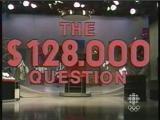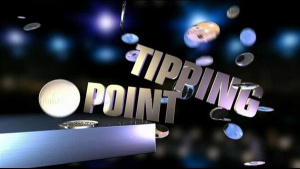Related Research Articles

The Weakest Link is a British television quiz show, mainly broadcast on BBC Two and BBC One. It was devised by Fintan Coyle and Cathy Dunning and developed for television by the BBC Entertainment Department. The game begins with a team of nine contestants, who take turns answering general knowledge questions within a time limit to create chains of nine correct answers in a row. At the end of each round, the players then vote one contestant, "the weakest link", out of the game. After two players are left, they play in a head-to-head penalty shootout format, with five questions asked to each contestant in turn, to determine the winner.

Hot Potato is a television game show that was broadcast on NBC in the United States from January 23 to June 29, 1984. From April 23 until its conclusion, the show was known as Celebrity Hot Potato.
The Joker's Wild is an American television game show that aired at different times between 1972 and 2019. In the show, contestants answer questions based on categories determined randomly by a mechanism resembling a slot machine. The show's title refers to the game's slot-machine mechanism also having jokers.

Twenty-One was an American game show originally hosted by Jack Barry that aired on NBC from 1956 to 1958. Produced by Jack Barry-Dan Enright Productions, two contestants competed against each other in separate isolation booths, answering general-knowledge questions to earn 21 total points. The program became notorious when it was found to be rigged as part of the 1950s quiz show scandals, which nearly caused the demise of the entire genre in the wake of United States Senate investigations. The 1994 film Quiz Show is based on these events. A new version of the show aired on NBC in 2000 with Maury Povich as host.
Masterteam was a BBC Television daytime quiz programme that aired on BBC One from 21 October 1985 until 21 December 1987. The programme was hosted by Angela Rippon.
Trump Card is an American syndicated game show that aired from September 10, 1990, to May 24, 1991, hosted by Jimmy Cefalo. Debi Massey served as hostess and Chuck Riley was the announcer. The show was produced by Telepictures Productions, Createl, Ltd., and Fiedler-Berlin Productions, with Warner Bros. Television distributing. It was based on the British game show Bob's Full House, which consisted of contestants trying to answer questions to fill up a 15-square bingo board.

Game Ka Na Ba?, formerly Pilipinas Game Ka Na Ba is a Philippine game show created by ABS-CBN. The main goal of the game is to win 2 million pesos by answering trivia questions.

Tic-Tac-Dough is an American television game show based on the paper-and-pencil game of tic-tac-toe. Contestants answer questions in various categories to put up their respective symbol, X or O, on the board. Three versions were produced: the initial 1956–59 run on NBC, a 1978–86 run initially on CBS and then in syndication, and a syndicated run in 1990. The show was produced by Barry & Enright Productions.

Miljoenenjacht, officially Postcode Loterij Miljoenenjacht, is a Dutch game show, sponsored by the country's postcode lottery, where a contestant and at-home viewer could win up to €5,000,000 or as little as €0.01. The show is broadcast at various times, spanning across six episodes for each set. The program was originally shown by TROS on NPO 2, but moved to creator John de Mol's channel Tien in 2005. After the channel was discontinued after its sale to the RTL Group, the program moved to RTL 4. In 2019, the program moved to SBS6 due to the transfer of Linda de Mol from RTL to SBS.

Who Do You Trust? is an American television game show.

The $128,000 Question is an American game show which aired from 1976 to 1978 in weekly syndication. This revival of The $64,000 Question was produced by Cinelar Associates and distributed by Viacom Enterprises.
Lucky Numbers was a weekly Bingo-based game show that aired on ITV from 9 January 1995 to 4 July 1997 and was hosted by Shane Richie.

The Vault is a British game show based on the original Israeli version called HaKassefet Hebrew: הַכַּסֶפֶת) that aired on ITV from 11 May 2002 to 24 August 2004. It was first hosted by Davina McCall in 2002, then hosted by Melanie Sykes from 2003 to 2004 and finally hosted by Gabby Logan who stepped in for Sykes for the latter half of 2004 when Sykes went on maternity leave.

Break the Bank is an American game show created by Jack Barry and Dan Enright and produced by their production company, Barry & Enright Productions. It was the first game show packaged by Barry and Enright as a tandem since their fall from grace following the 1950s quiz show scandals.

Fifteen to One is a British general knowledge quiz show broadcast on Channel 4. It originally ran from 11 January 1988 to 19 December 2003 and had a reputation for being one of the toughest quizzes on TV. Throughout the show's original run, it was presented and produced by William G. Stewart. Thousands of contestants appeared on the programme, which had very little of the chatting between host and contestants that is often a feature of other television quiz shows.

Pointless is a British television quiz show produced by Banijay subsidiary Remarkable Entertainment for the BBC hosted by Alexander Armstrong. In each episode, four teams of two contestants attempt to find correct but obscure answers to four rounds of general knowledge questions, with the winning team eligible to compete for the show's cash jackpot.

The American Bible Challenge is an American biblical-themed television game show created by Game Show Network. The series is hosted by comedian Jeff Foxworthy, with gospel musician Kirk Franklin joining Foxworthy as co-host and announcer in the second season. The series debuted on August 23, 2012.

Tipping Point is a British quiz show that is broadcast on the ITV network, with repeats also on W and Really. First airing on 2 July 2012, the programme is presented by Ben Shephard and features three players answering questions on the subject of general knowledge to win counters which they use on a large coin pusher arcade-style machine. Only the winner at the end has a chance to take home any money; the others leave with nothing except any non-cash prizes they may have won during the game.
Think Tank is an Australian television quiz show based on the British program of the same name. It premiered on the ABC on 5 February 2018 and is hosted by Paul McDermott.
Moneybags is a British game show that aired on Channel 4 from 8 November 2021 to 24 September 2022. It was hosted by Craig Charles, with Kevin Duala filling in for its last four episodes.
References
- 1 2 "Think Tank". ITV Studios . Retrieved 22 March 2016.
- ↑ Wightwick, Abbie (21 March 2016). "A grandfather from Bridgend is appearing on a daytime new TV quiz show". Wales Online . Retrieved 21 March 2016.
- ↑ "Series 2, Episode 3". Think Tank. 24 August 2016. BBC One.
- ↑ Think Tank: Can you Bank on the Think Tank? - ITV Ventures Limited - Google Books. 22 September 2016. ISBN 9780600634898 . Retrieved 24 November 2022.
- ↑ Raeside, Julia (21 March 2016). "Think Tank: Bill Turnbull's addictive new quiz is the next daytime TV smash". The Guardian . Retrieved 21 March 2016.
- ↑ Taylor, Frances (21 March 2016). "Think Tank review: was Bill Turnbull's new quiz show any good?". BT . Retrieved 21 March 2016.
- ↑ "ABC announces stellar line up for start of 2018". 1 December 2017.
- ↑ "Think Tank Programme Web Page". ABC Website. 5 January 2018. Retrieved 6 February 2018.